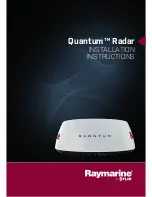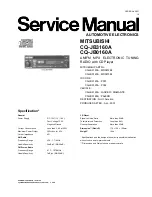
STATIONARY
DOPPLER RADAR
INITIAL SETUP
–
Remove the battery cover from the back of
the Traffic Advisor
™
. Insert the batteries in the
direction indicated by the polarity marks inside
the battery compartment and replace the cover.
–
Remove the clear plastic sticker that covers the
orange button and display on the front of the
unit and the yellow sticker from the back of the
unit.
RECALL READINGS
–
To recall up to the last 10 measurements,
simply TAP the black RECALL button. Each
time the button is tapped, it will display the
previously recorded speed, most recent first. A
single dash “-” indicates that you have reached
the end of the list.
AUTOMATIC SHUT-OFF
–
The Traffic Advisor
™
continues to display the last
speed until the button is tapped again or it will
automatically turn itself off after 30 seconds
of inactivity.
VERTICAL IS CRITICAL
–
The Traffic Advisor
™
makes a measurement by
sending out very low power radio waves and
looking for them to bounce off a moving object.
These radio waves are focused in a small cone
shaped like a flashlight beam which comes out
of the raised square on the back of the Traffic
Advisor
™
(the radar lens).
–
Hold the Traffic Advisor
™
straight up and down
vertically like a camera phone with the radar
beam pointing in-line with the path of the
moving object.
–
If you tilt the Traffic Advisor
™
down, the beam
may end up pointing into the ground and
missing the moving object.
–
Do not block the radar lens.
WATCH YOUR ANGLES
–
All Doppler speed radar technology measures objects moving in-line with the radar beam, not
perpendicular. To get the most accurate readings, make sure the path of motion is within the narrow radar
beam cone (about the shape of a focused flashlight beam). Tilting the Traffic Advisor
™
too far up or down
may also cause the beam to miss the moving object.
TOP VIEW
SIDE VIEW
INSTANT ON
–
The Traffic Advisor
™
will turn itself on and begin
the measurement sequence as soon as you “tap”
(quickly press and release) the ORANGE button.
–
When the Traffic Advisor
™
senses a moving object
it will display the speed. If it does not find anything
it will display “---”
–
There is no need to clear the display before
making a new measurement. If you tap the button
again the display will be updated with the new
reading.
1. BATTERY INSERTION AND GETTING STARTED
3. OPERATIONAL BASICS
The Traffic Advisor
™
Measures From the Back, Like a Camera Phone
Displays Remaining
Battery Life.
Displays Speed
of a Moving Object.
Displays Units
of Measurement.
Indicates When the Radar
Beam is Active.
Very Low Power Radio
Waves are Emitted From
This Radar Lens in a
Narrow Cone About the
Shape of a Focused
Flashlight Beam.
Battery Compartment For
2 AAA Alkaline Batteries
or Rechargeable NiMH
Batteries
Tapping the Orange Button
Makes a Quick Speed Reading.
Holding the Orange Button Makes
Continuous Speed Readings.
(Acceleration/Deceleration)
4. KNOW YOUR RADAR
FRONT
BACK
INCORRECT
INCORRECT
RADAR BEAM
Keep the radar lens clear of any objects.
Important to keep unit straight up-and-down. Do not tilt.
Recall Button Displays
the Last 10 Measurements
From the Unit’s Memory.
TRAFFIC
ADVISOR
™
TRAFFIC ADVISOR
™
2. IMPORTANT REMINDER
The Traffic Advisor
™
radar is designed for accurate traffic survey work in
traffic engineering, safety and calming programs. It is certified accurate
by the International Association of Chiefs of Police (IACP) designated radar
test lab. However, it does not have all the features recommended for Law
Enforcement use. The Traffic Advisor
™
radar is NOT intended for Judicial
Speed Enforcement applications.
CONGRATULATIONS!
YOU NOW OWN THE
WORLD’S SMALLEST
CERTIFIED ACCURATE
SPEED RADAR
F C C C L A S S B P R O D U C T L A B E L S TAT E M E N T
– This device complies with part 15 of the FCC Rules. Operation is subject to the following two conditions:
(1) This device may not cause harmful interference, and
(2) this device must accept any interference received, including interference that may cause undesired operation.
F C C C L A S S B U S E R M A N U A L S TAT E M E N T
– NOTE: This equipment has been tested and found to comply with the limits for a Class B digital device, pursuant to part 15 of the FCC
Rules. These limits are designed to provide reasonable protection against harmful interference in a residential installation. This equipment
generates, uses and can radiate radio frequency energy and, if not installed and used in accordance with the instructions, may cause
harmful interference to radio communications. However, there is no guarantee that interference will not occur in a particular installation. If
this equipment does cause harmful interference to radio or television reception, which can be determined by turning the equipment off and
on, the user is encouraged to try to correct the interference by one or more of the following measures:
• Reorient or relocate the receiving antenna.
• Increase the separation between the equipment and receiver.
• Connect the equipment into an outlet on a circuit different from that to which the receiver is connected.
• Consult the dealer or an experienced radio/TV technician for help.
– Changes or modifications not expressly approved by the party responsible for compliance may void the user’s authority to operate the
equipment.
IN-LINE IS CORRECT
The Traffic Advisor
™
simultaneously measures traffic
in either direction, moving towards and away
USER’S MANUAL
SIDE VIEW




















